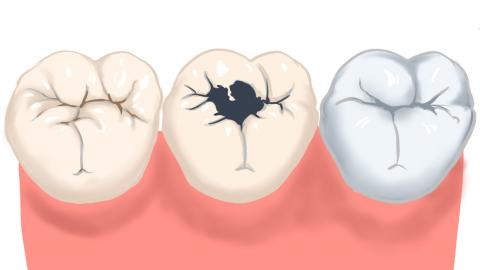What should I do if my front tooth has a cavity?
Generally,蛀牙 in the front teeth may be related to dietary habits, poor oral hygiene, insufficient saliva secretion, genetic factors, pulpitis, and other factors. Patients can alleviate symptoms by adjusting their diet, improving oral hygiene habits, drinking more water, and medication treatment. It is recommended that patients promptly visit a hospital and follow medical advice for treatment. Detailed analysis is as follows:

1. Dietary habits: Frequent intake of high-sugar and acidic foods provides growth conditions for bacteria, accelerating the formation of cavities. Adjust the diet structure, reduce sugar and acidic food intake, and perform regular oral cleaning and check-ups.
2. Poor oral hygiene: Lack of effective brushing and flossing habits leads to plaque accumulation, increasing the risk of tooth decay. Improve oral hygiene habits, brush teeth at least twice daily, use dental floss to clean between teeth, and undergo professional dental cleaning regularly.
3. Insufficient saliva production: Saliva has natural cleaning and buffering functions. Reduced saliva production weakens the mouth's self-cleaning ability, making cavities more likely to occur, possibly accompanied by dry mouth, difficulty swallowing, and altered taste. It is recommended to drink more water, chew sugar-free gum to stimulate saliva production, and avoid medications that cause dry mouth.
4. Genetic factors: Genetic factors may affect the strength of tooth enamel and the composition of saliva, making some people inherently prone to cavities. Regular oral health check-ups are recommended, along with enhanced oral hygiene education and preventive treatments such as regular fluoride applications.
5. Pulpitis: When tooth decay progresses to a certain extent, it may affect the dental pulp, causing pulp inflammation, manifested as spontaneous pain, nighttime pain, and other symptoms. Bacterial metabolism produces acid, which erodes the hard tissues of the teeth, forming cavities. It is recommended that patients use medications such as metronidazole tablets, tinidazole tablets, and cefixime capsules under the guidance of a physician to alleviate pain.
In daily life, one should brush teeth in the morning and evening, rinse the mouth after meals, and use dental floss or other cleaning tools to remove food debris and plaque between teeth. At the same time, an oral health check-up should be performed every six months or once a year to detect and treat cavities promptly.




